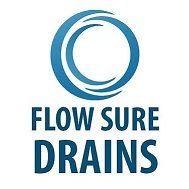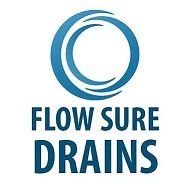What are the common causes of blocked drains?
Common causes include grease and fat buildup, food debris, hair, soap scum, foreign objects, tree root intrusion, and sanitary products.
How can I prevent my drains from getting blocked?
Avoid pouring grease down the drain, use drain guards to catch debris, avoid flushing non-flushable items, and perform regular drain maintenance.
What signs indicate that my drains are blocked?
Slow drainage, gurgling sounds, bad odours, water backup in sinks or toilets are signs of a blocked drain.
Can I use chemical drain cleaners to clear a blockage?
Chemical drain cleaners can be harmful and damage pipes. It's better to use natural methods or seek professional help.
Should I attempt to unblock the drain myself or hire a professional?
Simple blockages might be DIYable, but if the problem persists, it's best to give Flow Sure Drains a call to avoid causing further damage.
What tools or methods can I use to clear a blocked drain?
Plungers, drain snakes, and natural solutions like baking soda and vinegar can help clear minor blockages.
How much does it typically cost to have a blocked drain cleared?
Costs vary based on the severity and location of the blockage, but basic services might range from £95 to £150.
Is it possible to prevent tree roots from causing drain blockages?
Regular inspection and maintenance, avoiding planting trees near drain lines, and using root barriers can help prevent tree root intrusion.
What are the potential risks or consequences of ignoring a blocked drain?
Ignoring a blocked drain can lead to water damage, foul odours, potential health hazards, and more expensive repairs.
Are there any eco-friendly methods for dealing with drain blockages?
Baking soda, vinegar, and hot water can help break down blockages without harsh chemicals.
Can a blocked drain lead to foul odours in my home?
Yes, trapped debris and stagnant water can create unpleasant odours in your home.
Do I need to get permission to unblock a drain that connects to a public sewer?
In some cases, especially for drains that connect to public sewers, you might need to coordinate with local authorities or water agencies.
How do I know if the blockage is in my property's drainage system or in the main sewer line?
Multiple fixtures backing up simultaneously often indicate a main sewer line issue, while isolated backups could be in your property's system.
What should I do if the blockage keeps coming back after I've cleared it?
Repeated blockages may indicate a deeper issue, and it's best to call Flow Sure Drains to assess the situation.
Are there any DIY home remedies that can help prevent or clear drain blockages?
Regularly pouring hot water down drains, using enzymatic cleaners, and avoiding excess grease can help prevent blockages.
Is it safe to use a plunger on a blocked sink or toilet?
Yes, plungers can be effective in dislodging minor blockages in sinks and toilets. Just be cautious not to use excessive force.
What are the potential health hazards associated with blocked drains?
Blocked drains can attract pests, emit foul odours, and expose you to bacteria and germs, potentially leading to health issues.
How often should I have my drains professionally inspected and cleaned?
Regular inspections every 1-2 years and proactive cleaning can help prevent major blockages and maintain drainage efficiency.
Can heavy rainfall or weather conditions cause drain blockages?
Yes, heavy rain can overwhelm drainage systems, leading to blockages or backups. Proper maintenance can help prevent this.
Are there any legal responsibilities I should be aware of as a property owner regarding drain maintenance?
Property owners are typically responsible for maintaining drains within their property boundaries, while public sewer lines are usually managed by water authorities.
Quick & Reliable
We are available via email or telephone - contact us now on 07507 551 514 or 0117 9292755 Your blocked drains specialist
Location
Flow Sure Drains, 11, Winstone Court,St Michaels Hill, Bristol, BS2 8DX
Email
jmfacilitieslimited1@gmail.com
Call
07507551514
All Rights Reserved Flow Sure Drains | Built and Designed With Passion ByWooWeb.io
 Rating
Rating
All Rights Reserved Flow Sure Drains
Built and Designed With Passion By WooWeb.io



